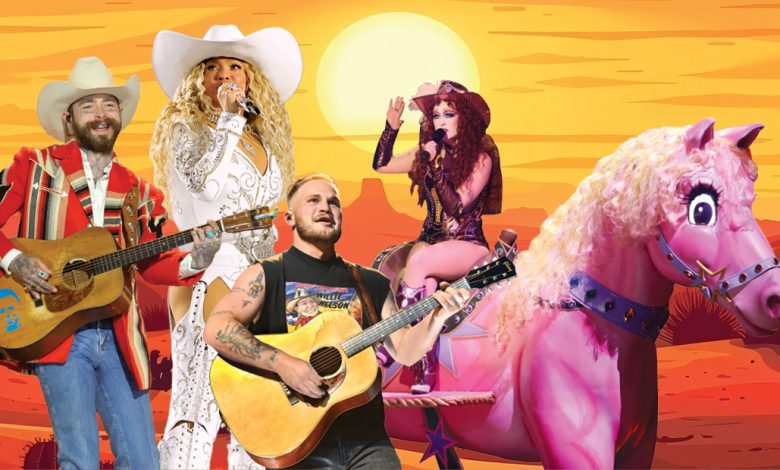How the Coastal Record Labels Crashed Nashville: “Artists Don’t Have to Follow Those Old Rules”

Nashville is experiencing a tidal wave from the coasts. As country music has exploded in popularity — thanks to superstars like Morgan Wallen, Luke Combs and Zach Bryan and crossover phenoms like Post Malone and Jelly Roll— what was once a siloed industry run by the “good ol’ boys” of Music City is today being influenced by deeper-pocketed record labels out of New York and Los Angeles. The result, both on the executive and artist-roster side, has meant shifting both priorities and perceptions.
Indeed, the numbers tell the story. Post Malone bounced back from a commercial low with 2023’s Austin, scoring one of the biggest hits of 2024 in “I Had Some Help,” with Wallen. Shaboozey, signed to Empire, a predominantly hip-hop label, tied Lil Nas X’s record for longest-running No. 1 song last year with “A Bar Song (Tipsy)”; and Chappell Roan recently entered the country chat with “The Giver,” which debuted atop the genre’s song chart. To say nothing of Beyoncé finally winning the coveted album of the year Grammy in February for her country effort, Cowboy Carter.
You might also like these posts:
The coastal wave comes as country has undergone its own digital revolution in the streaming era, opening a path beyond the traditional country radio system for artists. Streaming has turned the biggest country acts into global superstars who want help expanding their international reach, while also boosting artists that may not have fit the more typical Nashville mold in the past. Both cases have made the coastal labels a competitive spot for country talent.
“This has been bubbling for a long time,” says Joe Gallo, general manager of Sony’s flagship New York label Columbia Records (home to the country-adjacent Maren Morris and Lil Nas X, as well as Nashville newcomer Megan Moroney). “The maturity of streaming and the reach of these platforms has allowed anyone to consume practically anything, which has brought country to a lot more people.”
Columbia’s roster also includes Beyoncé, country rocker Koe Wetzl and the ACM best new artist nominees Ella Langley and Jessie Murph, the upcoming country-meets-pop-meets-hip hop singer.
“That accessibility has opened people’s appetite for all different types of genres and music,” Gallo says. “Jessie’s a great example, you hear the twang in her voice, she’s from Alabama, that could give a first impression that this is country. But she can spit bars like a rapper and has a vocal range that puts her in pop. And she’s found success in all of those genres.”
Nashville’s homegrown stars brought industry-wide attention to the genre in the 2010s, with acts like Lady A (formerly Lady Antebellum) clocking a massive mainstream smash with “I Need You Now.” “It was basically a booty call record,” says Greg Thompson, who was a high-ranking executive at their label, Capitol Records, at the time, and went on to work with Wallen. “There was a commonality of themes. The music speaks to anyone, not just red dirt people.”
Country’s success further ballooned into the 2020s thanks to artists like Wallen and Combs. But the catalyst for the current coastal invasion is undoubtedly Zach Bryan, who broke through in 2022 with American Heartbreak while circumventing the traditional Nashville system. He is signed to Los Angeles-based Warner Records, doesn’t live in Nashville and has never particularly catered to country radio. His tour numbers are astronomical, with last year’s Quittin’ Time Tour grossing $199 million last year on over 1 million tickets sold.
“In the country market, there was a system that worked really well for that audience for a long time,” says Tom Corson, Warner’s co-chairman and COO of Bryan. “And then during COVID, a broader audience signed up for streaming services, and you could just see that the traditional pathway of country and how it worked wasn’t serving the broader audience. Is Zach a completely country artist? No. He could fall under a Dylan or a Springsteen songwriter. His music does have a country, heartland, americana, rock influence. At the end of the day, the songs are impeccable, the artistry is great, and Zach continues to be the biggest story globally.”
As Katie Fagan, who was named the president of New York indie Label Mom + Pop’s newly established Nashville office in February, says: “He was definitely the turning point. I think he proved that you don’t have to do the typical country blueprint development, going to radio. Artists don’t have to follow those old rules. After that started happening, that’s when I saw the first wave of labels wanting to scoop up the Zach Bryan 2.0s.”
Barry Weiss, the veteran record executive who co-founded RECORDS back in 2015, saw success out of Nashville in 2018 with Matt Stell’s “Prayed For You,” and RECORDS opened a Nashville office in 2020. They signed teenage country act Ty Myers last year in a deal with Columbia. As Weiss said in an email: “Folks in New York and LA are keenly aware and interested these days. It’s also the new rock for young folks all leading to an organic explosion.”
As the coasts try to find their own stars, they’re driving up the price on signings with more artist-friendly deals than what the Nashville system had historically offered — namely shorter terms and more ownership of their music. According to Seth England, CEO of Big Loud (which counts Wallen on its roster), bidding wars for acts have gone from five to six companies five years ago to as many as 20 to 25 today.
“It’s not just perennial powerhouse labels, this is also R&B companies based in Atlanta and hedge funds out of Miami,” England tells The Hollywood Reporter. “When you get to the bottom of the list of suitors, you start scratching your head and wonder what infrastructure they have, or what they know about country at all.”
“Genres get hot, and when they do, there’s profit to be made,” says Jon Loba, president of frontline records at BMG, who’s turned the company into a country powerhouse with artists like Lainey Wilson and Jelly Roll. “We’ve seen these cycles in country before. Fortunately, every time we’ve seen that initial wave and lift, the numbers at the cooling point are still higher than before the surge.”
The coastal labels can be effective partners for Nashville as well, allowing access to more resources, especially in the realms of streaming and international marketing. Of Republic Records, which also distributes Taylor Swift and Ariana Grande, and its co-founders Monte and Avery Lipman, England says, “The best partner for Big Loud is probably someone who is a little different.”
A mix of coastal and Nashville representation is also enticing for artists who may go beyond the mainstream country business, or who may not have been represented by the old Nashville system in the past. One of those artists is Ink, a Black queer songwriter from Georgia who’s signed to Big Loud and Electric Feel, the music management, record and publishing company that manages Post Malone.
Ink penned the Cowboy Carter tracks “16 Carriages,” “Texas Hold ‘Em” and “Ameriican Requiem,” but her biggest hit thus far has been co-writing Kendrick Lamar and SZA’s “Luther,” one of the biggest rap songs on the planet. A country act in her own right, Ink’s looking to take the spotlight herself this year and has her own music on the way. As she says, the sound of country goes far beyond the typical image that may have been associated with the old Nashville system.
“Country music isn’t just a white man in a tank top driving a pickup truck,” Ink says. “That’s a stereotype that happened in Nashville in that scene, but where I’m from, that’s not it. In my hood, you see people who look like me drinking moonshine, playing cards, barefeet in the grass, family stories. That’s the country we know.”
Ink’s been careful about building a team that could champion her country presence while not keeping her pigeonholed in any one genre. “Big Loud is big and has a Nashville core, and Electric Feel is West Coast and has the California vibe and is an international powerhouse,” Ink says. “They both understood that there’s no genre for me, no box. They understood that we are genreless.”
As England says: “She’s one of the most versatile people I’ve ever met. When Austin [Rosen, Electric Feel’s CEO] called me about Ink, I listened to the music and called back two minutes later like ‘what is this?’ Ink’s one of one, she needed a one of one team, we linked up a few styles of partners with different areas of expertise. Because she’s not just a pure fit in any one place I think she’ll break out first going direct to fans.”
At the same time the coastals have come in, Nashville has experienced a significant changing of the guard in the last year with all three majors installing new leadership. Most recently, UMG Nashville CEO Cindy Mabe exited in February. Sources suggest her departure may have been due to ineffective communication with her west coast bosses.
“So many people have been replaced within the labels that were maybe putting up the barriers,” says Matt Graham of Range Media Partners, whose management slate includes country upstart Dylan Gossett, who’s signed to Big Loud and Mercury. “I think there was a real fight in the beginning and the higher ups at the corporate labels had to step in. Now you’ve got to be cool with it because the powers at the top of the three major companies said this is how it’s going to be.”
For many country stalwarts, it’s not their first time at the coastal rodeo, which is to say, there may be a tinge of animosity — perceived or real — in the coasts barging in and getting while the getting’s good.
“There’s some incredible people here who really care and have embedded themselves in this music, and there certainly are some bad actors coming out of the woodwork because of the momentum,” says England.
Fagan concurs. “I’ve had conversations where labels say ‘country’s hot right now, we can just hire a consultant,’ and you can see that this would grate the teeth of people who’ve been developing this business for decades,” she says. “Having boots on the ground here is so incredibly important. This isn’t a city where you can just dip your toe every couple months and call yourself a Nashvillian.”
To be sure, Nashville is known as a “10-year Town,” where artists usually develop slowly over time — the antithesis of today’s research-obsessed instant gratification-seeking pop labels.
“That’s not how the coastal labels are used to doing things anymore, it’s very hit-driven, very research-based, and we’ll see if that becomes the dominant strategy for Nashville as well,” Graham says. “There’s something to be said about having time to play a lot and get your 10,000 hours in before you play for the general public.”
“Time will tell” if the coastals stay long-term, adds BMG’s Loba. “My sense is no because there will be another genre getting hot, and there’s money to be made elsewhere. But none of us can answer that question until we see who’s here once things have cooled down a bit.”
Still, as more artists look to chart their own paths beyond the old systems, it’s difficult to imagine they’re going back.
“I’m an indigenous Black female from the south, I don’t know how much room there was for me to begin with,” Ink continues. “I’m not looking to fit in anywhere, I want to create what’s new. We’re a new generation, we’re not trying to fit in any mold. I think it’s about time the mold fit for us musicians.”
Source: Hollywoodreporter
Related Posts
- BAFTA TV Awards: ‘Industry,‘ ‘Baby Reindeer’ Stars Among Winners
- Denise Alexander, Dr. Lesley Webber on ‘General Hospital,’ Dies at 85
- Robyn Lively Reacts to Sister Blake Lively’s Speech Where She Alluded to Justin Baldoni Legal Battle (Exclusive)
- Most Anticipated Concert Tours of 2025: Beyoncé, Billie Eilish, Kendrick Lamar & SZA, Sabrina Carpenter and More
- As It Turns 25, IFC Films Announces Rebrand





